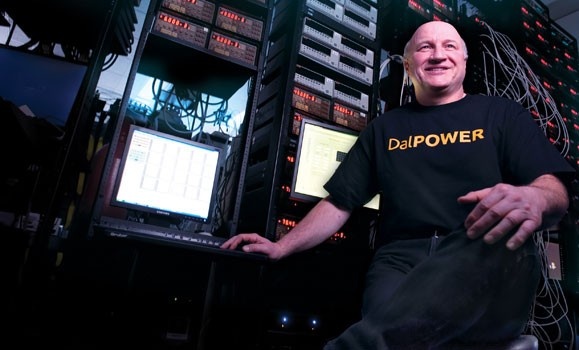The year is 2008. Research associate David Stevens and graduate student Aaron Smith scour Ebay, searching for a deal. They work for Professor Jeff Dahn, Dalhousie’s Canada Research Chair in Materials for Batteries and Fuel Cells. Unless they find the equipment they need at the right price, the High Precision Charger that Dr. Dahn envisioned and that Mr. Smith designed will remain only a tantalizing possibility.
Four years and thousands of hours of practical and theoretical work later, Dr. Dahn and his grad students have translated that tantalizing possibility into a world-changing reality. Their work has attracted industrial partners like General Motors, Magna E-Car systems, Nova Scotia Power, Medtronic Energy and Component Centre, and 3M, and Dr. Dahn has received $4.1 million to advance the performance of lithium-ion batteries.
The High Precision Charger (HPC) Dr. Dahn and his students built in the Dunn Building is the world’s only automated high precision charger system for testing lithium-ion batteries. It’s now possible for Dr. Dahn to make statements about battery lifetimes in three weeks that previously could have taken several years.
With the data from the HPC, Dr. Dahn's team will be able to help develop lithium-ion batteries that last 10, 20, or even 50 years. Hopefully these batteries will cost less, and store more. This has generally far-ranging implications – simply consider every electronic device that has a Li-ion battery in it – but specifically, this has important implications for the automotive industry, sustainability and clean tech, and the health sector.
With longer-lasting, more economical, higher-storage capacity Li-ion batteries, electric cars become more attractive. It will be possible to add even more wind power to the Grid if electrical energy storage is incorporated. And people with implanted, battery-powered medical devices can live longer without invasive procedures to replace fading rechargable cells.
These are just some of the ways that Dalhousie’s research and development innovations are helping to change the world.
“Our research professors conduct research that matters: to the economy, the environment, and to people in their daily lives,” said Martha Crago, Vice President (Research) at Dalhousie. “That’s the power of our research. That’s Dal.”

